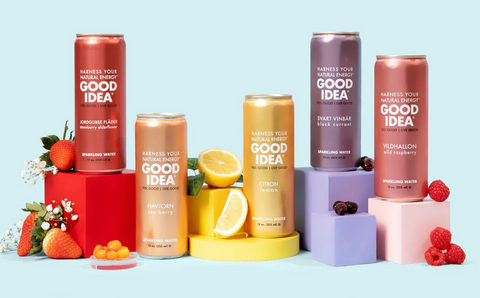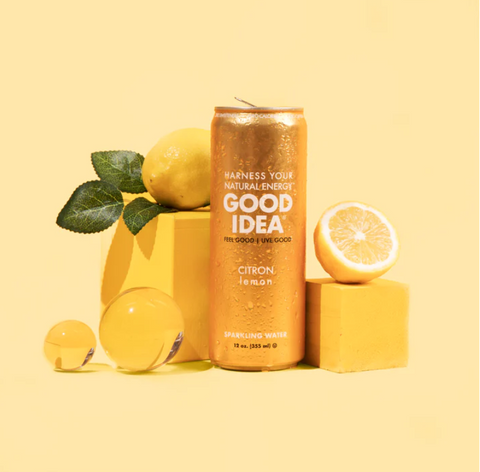Soda Water vs Sparkling Water: Understanding the Fizz in Your Beverage

The soft drink sector is bubbling with a fizzy water trend, reshaping the way we think about hydration and enjoyment. In a shift away from sugar-heavy sodas, carbonated water has surged in popularity among individuals seeking a health-conscious alternative.
However, not all bubbles are created equal, and today’s savvy consumer needs to understand the nuances between soda water and sparkling water to make the best choice for their well-being. In this comprehensive analysis, we'll dissect the differences between these two effervescent delights and guide you through the path of knowledgeable carbonated water consumption.
Defining Soda Water and Sparkling Water
Soda water and sparkling water are the quintessential 'sparkling beverages,' admired for their refreshing qualities. However, their production processes and core components set them apart.
Soda Water Unveiled
Soda water is a type of carbonated water that has undergone a specific carbonation process. Typically, it's carbonated using a soda siphon or a device akin to a carbon dioxide gas cylinder. This method imparts a vigorous effervescence, and in its purest form, soda water is just that—water that's been injected with carbon dioxide. It is the foundation of many popular carbonated drinks and cocktails.
Ingredients in soda water are usually limited to carbonated water and sodium bicarbonate, which contributes to its slightly saline taste. Some commercially available soda waters may also contain small amounts of added salts, offering a characteristic flavor that balances the sharp taste of carbonic acid produced by the carbonation process.

Purity of Sparkling Water
Sparkling water, on the other hand, is created naturally when water is infused with carbon dioxide, derived from various sources. It often boasts a cleaner profile than soda water, without additional salts or other minerals added. Today, many brands offer sparkling water in a variety of intensities, from subtly carbonated to the supercharged fizz that rivals any soda.
Traditionally, sparkling water was sourced directly from natural springs and charged with carbon dioxide before being bottled, ensuring a more pristine taste. Modern methods tend to mimic this by adding food-grade carbon dioxide to treated municipal water, which is then bottled or canned.
Nutritional Comparison
Understanding the nutritional content of soda water and sparkling water is vital for health-conscious individuals. While both are healthier alternatives to sugary drinks, there are key differences in their compositions.
The Caloric Profile
Sparkling water, untreated with any additives, contains zero calories. Soda water, including sodium bicarbonate and optional mineral salts, can range from zero to a few calories. However, flavored varieties of either drink often include sweeteners or natural sugars, which contribute to the calorie count.
Sweet Surrender
Sugar content is a critical consideration. Both soda and sparkling water are typically void of sugar, but some flavored options may contain natural fruit sugars or sweeteners like stevia or erythritol.
GOOD IDEA: The Top Zero-Calorie Option
In today’s health-conscious world, many individuals are looking for ways to reduce their calorie intake without compromising on taste. GOOD IDEA offers guilt-free carbonated water with zero calories and no added sugars. Using only the essence of real fruits and lightly carbonated water, GOOD IDEA provides all the refreshing qualities of carbonated water without any added calories or artificial sweeteners.
Additionally, GOOD IDEA is enhanced with amino acids and a unique ingredient called chromium picolinate, which has been shown to help maintain healthy blood sugar levels. This makes GOOD IDEA a smart choice for individuals looking to manage their blood sugar levels while still enjoying a delicious beverage.
Saline Solution
Sodium levels in soda water are generally higher due to the added sodium bicarbonate and salts. This is where the choice to drink sparkling water may offer a lower-sodium alternative, particularly important for those watching their salt intake.

GOOD IDEA has 0mg of sodium making it a much healthier option for individuals with dietary restrictions. Plus, the added amino acids and chromium picolinate in GOOD IDEA can provide the additional health benefit of helping to maintain balanced blood sugar.
Health Benefits and Concerns
Carbonated water serves as a vessel to increase water intake for those who find plain water unappealing. However, there are also some concerns.
The Cavity Connection
One common misconception is that the carbonation process, which produces carbonic acid, can lead to tooth erosion. While excessive consumption of acidic beverages can contribute to dental issues, the pH of most carbonated or sparkling waters is near neutral, and when drunk in moderation, the impact on dental health is minimal.
Bloating Bewilderment
Another concern is that the carbonation process can cause gastrointestinal distress. For some, carbonated beverages can lead to bloating or a feeling of fullness, which may be uncomfortable but is usually harmless. However, reducing or avoiding carbonated drinks may be preferable for those with gastrointestinal conditions.
Fortunately, GOOD IDEA is lightly carbonated considering the discomfort carbonation can sometimes cause. So, consumers can enjoy the refreshing benefits of GOOD IDEA without any worries.
Flavored Varieties: A Palette of Possibilities
One of the joys of carbonated water is the wide array of flavors available. From citrus infusions to exotic concoctions, there's a sparkling water flavor to suit every palate. However, these flavors can be derived from both natural and artificial sources, and here's where health-conscious decision-making comes into play.
The Natural Enhancement
Naturally flavored carbonated waters derive their taste from essences. When choosing a healthier option, natural is generally the preferred route in contrast to artificial flavors.
At GOOD IDEA we keep our drinks deliciously calorie-free by emulsifying berries to extract their essence or flavor. This process removes the caloric content of the berries, leaving behind only their delicious taste. By using emulsified berries, we can ensure that our drinks are free from any added sugar or sweeteners.

The Artificial Angle
Artificially flavored carbonated waters are compounded with synthetic compounds to imitate flavors. They contribute to the debate about additives and their potential health implications. While regulatory bodies such as the FDA ensure the safety of food additives, many prefer to steer clear where possible.
Sustainability and Packaging
Beneath the enjoyable fizz lies a pressing issue—sustainability. The production and distribution of carbonated water, particularly those in disposable packaging, can have environmental repercussions.
The Eco-Friendly Effort
Packaging choice is critical. Opting for brands that use recyclable or reusable materials is a step in the right direction. Some companies are innovating with biodegradable packaging to reduce the environmental impact.
Consumer Tips
When it comes to selecting the healthiest option, certain tips can guide your purchasing decision.
Read the Labels
Be vigilant about the ingredients. Sugars, artificial sweeteners, and preservatives can hide in flavored varieties and cause your blood sugar to rise. Look for the simplest ingredients list with the fewest processed components for the cleanest choice.
Enjoy in Moderation
Like all good things, moderation is key. While carbonated waters are generally safe for daily consumption, ensuring a varied and balanced diet that includes plain water is crucial to overall health and hydration.
FAQs
Q: Is carbonated soda water the same as sparkling water?
A: No, carbonated soda water and sparkling water are two different drinks. Carbonated soda water is simply water that has been infused with carbon dioxide, while sparkling water occurs from natural processes.
Q: Can carbonated water help with weight loss?
A: Carbonated water can be useful for weight loss, as it can serve as a low-calorie substitute for sugary drinks and may aid in reducing snacking habits. However, it should not be relied upon as a sole method for weight loss. A balanced diet and regular exercise are essential for overall health and weight management.

Q: What are other kinds of fizzy waters?
A: Other types of fizzy waters include tonic water, which contains added quinine, and mineral water/ sparkling mineral water which naturally contains minerals such as calcium and magnesium. Some beverages may also be labeled as "sparkling juice" or "sparkling flavored water," but these often contain added sugars or artificial flavors.
Q: Does carbonated water hydrate you as effectively as regular water?
A: Yes, carbonated water can still provide hydration.
Q: Is sparkling water the same as club soda?
A: No, sparkling water and club soda are two different types of carbonated water. Club soda contains added minerals such as sodium and potassium bicarbonate, while sparkling water is typically just carbonated water.
Q: Is it safe to drink carbonated water while exercising?
A: It is generally safe to drink carbonated water during exercise, but it may cause bloating or discomfort for some individuals. Plain water is still the best choice for staying hydrated during physical activity.
Q: Is there a difference between sparkling water and seltzer water?
A: Yes, while both are carbonated waters, seltzer water is simply carbonated water with added artificial flavors and no minerals. Sparkling water may contain added minerals or natural flavors.
Q: Can I add fruit or herbs to carbonated water for flavor?
A: Yes, adding natural ingredients like berries, citrus slices, or fresh herbs can enhance the taste of carbonated water without adding a large amount of calories or artificial flavors.
Q: Can carbonated water cause tooth decay?
A: While plain carbonated water does not contain sugars that can lead to tooth decay, flavored varieties may have added sugars that can contribute to dental issues. It is best to check the ingredients and consume sugary drinks in moderation.
Q: Does carbonation affect nutrient absorption?
A: Carbonation itself does not significantly impact nutrient absorption. However, excessive consumption of carbonated drinks may lead to bloating or discomfort, which can affect digestion and absorption.
Conclusion
The effervescent market for sparkling waters has never been more diverse, offering a fluid kaleidoscope of choices. Soda water and sparkling water each have their place, but understanding what distinguishes them can make a world of difference to your dietary choices.
Ultimately, the decision between a zesty soda water or a pure sparkling water is yours, but armed with this knowledge, you can make a choice that not only tantalizes your taste buds but supports your health and the health of the planet.



